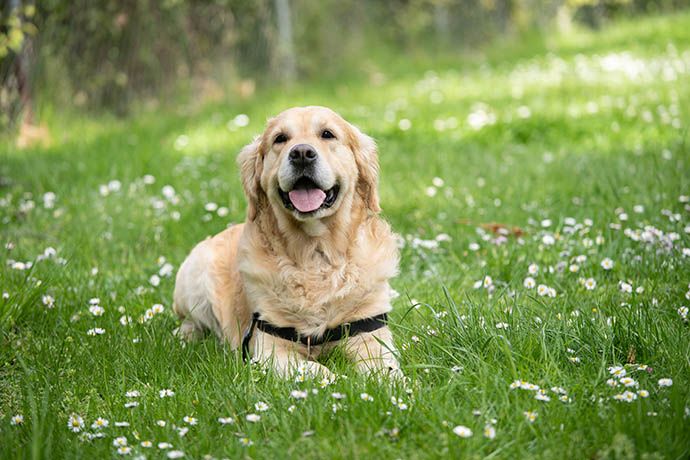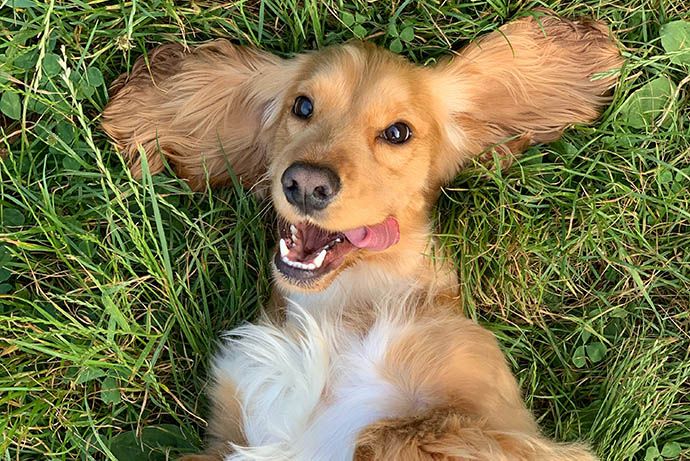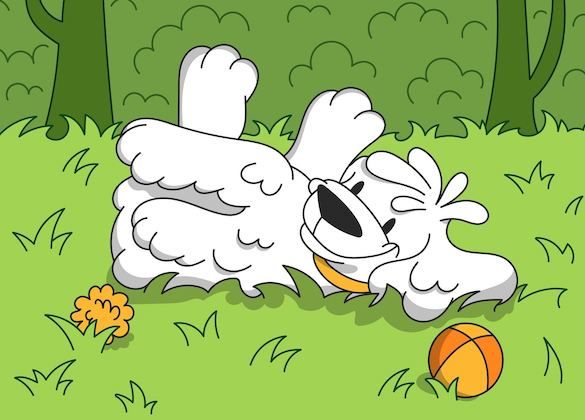Whenever dogs go outdoors, you might have noticed their affinity with grass. Yes, it’s quite common to see a dog rolling in grass. Whether in the backyard, in the neighborhood park, and well... wherever there’s grass, a dog’s appreciation for it seems apparent.
And while it might seem really weird for us humans, dogs have their reasons for this behavior, and there’s actually some history to it as well. So, why do dogs roll in the grass?
Stop Googling - Ask a Real Vet
Reasons Why Dogs Roll in the Grass
You’ve probably seen your dog do it on several occasions. You’re walking with them, then they find something that piques their interest. What’s that, you say? Well, it looks like none other than grass. They then start lying and rolling in it. If you encounter this behavior often, you’ve probably wondered what makes grass to attractive to your pooch.
Instinct
Let’s look closer into dogs’ ancestry. Research tells us that one likely reason why dogs roll around in grass is their natural instinct to mask their scent from prey in the wild.
Grass contains a variety of smells from the environment, and the act of rolling in grass helps animals mask their own scent and get a chance to go near their prey. While dogs have been domesticated and aren’t really hunting for prey since their humans give them food, they may be still acting on their instinct.

Meanwhile, according to Pat Goodmann, a researcher who has studied how wolves practiced scent rolling, the behavior might also indicate that dogs want to bring some information back to the pack through the smell. Another theory by Simon Gadbois, a canine behavior expert, is that some dogs might want to roll in the same grass as their pack to foster a sense of togetherness with other dogs.
Making Their Mark
Another possible reason why your dog is rolling in grass is that they want to mark their scent, just like when they rub themselves on their bed, toy, and on you too. It’s as if they’re marking the spot as theirs, or they might want other dogs to know that they’ve been there.
Attraction or Aversion to Smell
The truth is a dog relies much on their sense of smell. In fact, dogs are actually able to smell some scents in parts per trillion. Their noses have 300 million olfactory receptors, which is 40 times more than us humans. Isn’t that amazing?
You’ve probably noticed it too when they sniff on everything they pass by, especially during walks. So, when we might just smell the grass, dogs can smell a multitude of things — the scent of dogs that recently passed by that patch, food particles, insects, and plants.
Also, take into consideration that some scents that we find delightful are probably not so appealing to dogs. For example, there are dog shampoos that smell so good for us humans, but may actually smell bad for a dog. Because of this, they might want to rub off the fragrance from themselves when they get a chance to lay and roll in the grass.
Irritation or Allergies
Another possible reason why your dog is rolling in grass is an itchy feeling due to skin irritation or allergy. If so, you would want to address this issue first to relieve your dogs’ discomfort. If your dog is rolling around in the grass because of an allergy, it's usually accompanied by other symptoms such as: swelling, redness and skin irritation, hair loss, itchy ears, hives, and sneezing.
You might also notice that they also rub themselves on surfaces such as rugs, carpets, and the like. If this is the case, it’s best to schedule an appointment with a veterinarian to determine if it’s indeed an allergy, and what treatment would be best for your dog.
In severe cases of allergy, emergency veterinary care may be needed. In such situations, medical bills can increase exponentially. Not to mention, the stress involved in deciding on the best treatment to help your pet. Because of this, investing in your pet’s health and wellness is essential.
In unexpected situations involving your pet, Petcube’s Pet Emergency Fund provides the support and assurance that you need. A subscription covers $3000 per year for upto 6 pets, welcome pets regardless of age, breed, and medical history. Claiming of payment after treatment won’t be a problem since they pay as soon as they get the medical bill. They also have an online vet service so you can consult about anything regarding your pet’s health and wellness.
If you want to invest in your pet’s health, now is a great opportunity to do so. Luckily, we’re offering our blog readers an exclusive 27% off if you follow this link.
They Simply Love the Feeling
It could also be that your dog just appreciates the feeling of rolling in the grass. Observe your dog’s body language as they roll. If they look relaxed and happy, that’s a good sign that they are just enjoying the sensation of soft grass and the company of those around them.

Is it Okay if a Dog Rolls in Grass and How to Stop it?
It’s quite common to see dogs rolling in the grass, and as long as they’re not rolling in stinky odors or trying to alleviate skin irritation or allergy, it’s most likely not a cause for concern. It might actually be good for your furry friend if it makes them happy, relaxed, and feel closer to their roots.
If, however, your dog appears to be obsessed with rolling in the grass and you want to redirect the behavior, positive reinforcement training might be an answer. When your dog starts to roll, try to catch their attention, and when they stop the rolling, praise them or offer them a treat. This helps them understand what behavior is expected from them.
In the process, teaching them commands such as sit, stay, and down are often effective as well. If you’re having a hard time training your dog on your own, you can contact an animal behaviorist or trainer to help you redirect your dog’s behavior effectively.
In cases where your dog just rejoices in rolling in the grass because of the sensation, the smell, their instinct, or fostering togetherness, there is nothing to be concerned about. Rather, it’s something to be appreciated and enjoyed.
Was this article helpful?
Help us make our articles even better









